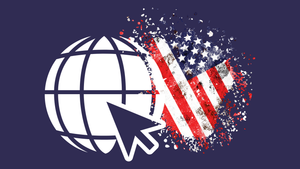The Society Of Composers & Lyricists has welcomed the latest proposals in US Congress to make the music industry’s anti-piracy tactic of choice - web-blocking - available under American copyright law for the first time. The music creator group says that new laws to force internet companies to block piracy sites would help “ensure our industry remains viable in the digital age”.
But big tech is already lobbying against the proposals, aka the Block BEARD Act, noting that the music and movie industries have been pushing for web-blocking in the US for a very long time indeed. “Despite a clever acronym that distracts from the truth”, says lobbying group Re:Create, “the Block BEARD Act is a new name for a decades-old attempt by big content to control the internet through site-blocking”.
Big tech is wrong of course. There is nothing clever about the incredibly laboured acronym here, with ‘Block BEARD’ standing for the ‘Block Bad Electronic Art And Recording Distributors’. Even in Congress, where laboured acronyms - or, technically, backronyms - are commonly employed to name legislative proposals, that’s a pretty rubbish name.
The music and movie industries would also argue that big tech is wrong to say that web-blocking is about “controlling the internet”. And they would also strongly dispute another claim made by Re:Create last week: that web-blocks are “a dangerous mechanism” for “content trolls” looking to take down “legitimate content”.
Those were the doom and gloom predictions that got the first round of web-blocking proposals, back in 2011, completely kicked out of Congress. But, the copyright industries would argue, more than a decade of web-blocking in other countries since then has proven all the doom and gloom predictions wrong, even if Re:Create is rolling them out again in 2025.
Web-blocking is a legal framework via which internet service providers - and possibly other internet companies like search engines, VPNs and DNS resolvers - are ordered to block their customers from accessing specific piracy sites. The orders usually come from the courts prompted by legal action from a copyright owner.
In many countries around the world, including the UK, web-blocking is now pretty standard, with music and movie companies - as well as the owners of TV and sports rights - routinely securing new court orders.
And usually without controversy. Although recent efforts in Europe to force DNS resolvers to web-block have resulted in some push back, with Cisco’s OpenDNS going as far as to pull out of markets where web-blocking is now a requirement.
In the US, the proposals to introduce web-blocking in 2011 proved so controversial it took more than a decade for them to get back on the agenda in Washington. Earlier this year proposals were introduced in the House Of Representatives in the form of the more sensibly named Foreign Anti-Digital Piracy Act.
The BEARD Act was introduced into the Senate last week by senators Thom Tillis, Chris Coons, Marsha Blackburn and Adam Schiff. Both proposals in Congress would allow rightsholders to secure web-blocks against piracy websites that are not based in the US and which are therefore much harder to target directly with legal proceedings.
“Foreign piracy sites are stealing from American creators, threatening good-paying jobs and exposing US consumers to real online harms via malware, identity theft and the like”, Tillis said last week when introducing a first draft of the BEARD Act.
The proposals, he added, would introduce a “smart, targeted tool to stop these criminal operations at the source without infringing on legitimate speech or due process”, in doing so protecting “our creative economy and digital security”.
Re:Create brings together trade bodies that speak for big tech with organisations that represent libraries and which campaign for digital rights. While copyright owners argue that web-blocking has worked fine in other countries, despite the doom and gloom predictions, Re:Create points to the recent controversies regarding web-blocks in Europe.
“Site-blocking frameworks serve as a tool for widespread censorship in other countries”, it said in response to the Block BEARD Act being introduced, adding, “these frameworks are a stark violation of America’s commitment to a free and open internet. Congress should see Europe’s experience as a cautionary tale and learn from their mistakes”.
But groups representing creators and rightsholders are supporting the proposals, including the Society Of Composers & Lyricists. “Foreign piracy sites exploit our work without consent or compensation, undermining the creative contributions of thousands of professionals and putting American consumers at risk”, it said in a statement.
“The Block BEARD Act”, it then added, “is a focused and lawful tool to defend intellectual property rights and ensure our industry remains viable in the digital age”.

